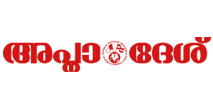COMMENTARY ON CHANTHAM CHARTHAL
At the beginning: We are now beginning the Chantham Charthal, which is a preparation ceremony according to the Knanaya tradition. The meaning of Chantham Charthal is beautification. In the past, royal families used this name for their shaving. This is an ancient practice of both physical and spiritual preparation for the groom before his wedding. In the past, this practice was conducted in a pandal or tent in the front yard of the groom’s house the night before the wedding. We shall begin this ceremony with a brief prayer service. Please stand.
After Prayer: The groom’s sister(s) will now arrange a low seat (kurandi) for the groom on the dais and cover it with a new white cloth. Before introducing chairs in Kerala, people used to sit on kurandi like this. Covering it with a new white cloth is a symbol of nobility, purity, and newness. As a sign of the divine presence of Jesus, the light of the world, a traditionally lit torch called Nilavilakku will be placed on the stage.
After placing the kurandi and lamp: The groom is now entering the pavilion escorted by his brother-in-law and will occupy the kurandi. We will sing our traditional prayer song remembering St. Thomas the Apostle. Let us now welcome the bridegroom to the stage.
After the groom sits on stage: In the past, males would marry when they were fifteen or sixteen years old. The groom waited until his marriage to shave his face. He had his first shave the day before the wedding as part of the marriage rituals. Along with that, hair cutting was also done. The family had invited the local barber for the function as a public ceremony. Since the groom is an adult now, no full shaving or hair cutting is done except as a symbolic ritual.
The barber shall now come on stage and courteously ask for the approval from the audience three times before performing the Chantham Charthal. He will ask, “I ask the nobles above seventeen casts; Shall I beautify the groom?” This shows the elevated status the Knanaya Community had over seventeen casts of Kerala in the past. After obtaining the approval of the audience, the barber will shave and cut the groom’s hair.
Seeking permission to apply oil: The barber will ask three times, “Shall I apply oil?” After getting permission from the assembly, he will apply oil on the groom’s hair, hands, and feet. The barber has the privilege of owning the balance oil, the new white cloth spread on the kurandi, and receive an honorarium from the family. After receiving those, he will leave the stage. During this time, the choir will sing Chantham Charthal Song and other traditional songs.
After the barber’s service: The brother-in-law now escorts the bridegroom to cleanse and adorn him with exquisite clothing and jewelry. During that gap, the choir will sing a few more traditional songs.
After the bridegroom returns to the stage: The groom is returning to the stage after his bath and dressing. This is the moment to present Ichappad, a mixture of white rice pudding and jaggery. The bridegroom’s sister will bring the Ichappad along with the traditional utensils, kindi and kolambi to wash the bridegroom’s mouth.
The paternal uncle of the groom wraps his shoulder cloth around his head like a turban, with both ends of the cloth pointing upward. He will ask the audience’s consent three times to present the Ichappad. After getting that from the audience, he will help the groom wash his mouth once with kindi and Kolambi (Poothrukayil, p. 6). Uncle then washes his own hands. Supporting his hand’s right elbow with his left hand, he will feed the groom three times with his right hand, combining white rice pudding and jaggery. After that, two more family members will wash their hands and present the Ichappad while keeping the shoulder cloth on their shoulders.
After giving Ichappad: Chantham Charthal ceremony is over. The last person who did it will help the groom rinse his mouth using Kindi and Kolambi once again. Afterwards, the brother-in-law will now take the groom inside the house.

The Knanayology Foundation (Knanaya Global Foundation NFP), a non-profit organization registered in IL, USA, hosts Knanayology and undertakes other projects on Knanaya Community .







